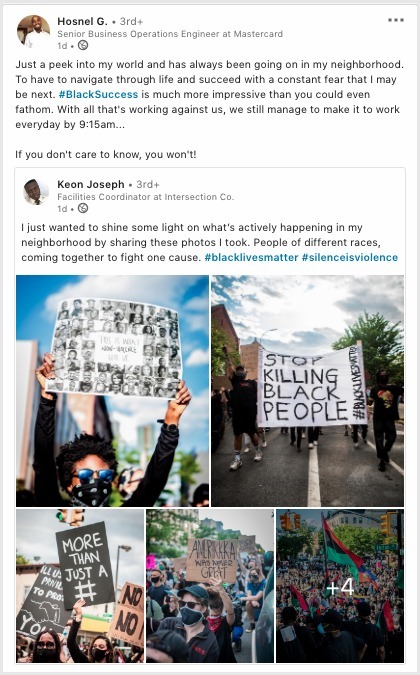Supporting Black colleagues at work
The best workplaces create environments where employees thrive professionally and personally. World class cultures do this no matter what is happening in the world. In fact, they double down on their commitment to employees during a crisis, whether that’s a pandemic or racial violence. Just as emotional support during the Covid-19 health crisis is important for all employees, supporting Black colleagues at work after incidents of racial violence and injustice is critical. Black and BIPOC team members need to know you really care about their personal and professional well-being.
Stories Inc. helps companies uncover stories from people of color to illustrate culture, transcending blanket diversity and inclusion statements on a webpage. To do our job well, we need to listen, and we need to create content that can be amplified. We have found these actions can provide active support to Black colleagues. Here are others.
Check in on Black colleagues
When Black team members work in predominantly White spaces, empathy from leadership is especially important. Existing in the minority at an organization can be stressful and alienating. Tonya Russell shares, “It is crucial for employers to check in with their employees and acknowledge the news events of the past few weeks.”
Directly addressing incidents of racism in the news, or not, impacts Black team members’ feelings of inclusion. Diversity and inclusion experts Laura Morgan Roberts and Ella F. Washington make the connection between workplace responses to racial events and the BIPOC employee experience. “Research shows that how organizations respond to large-scale, diversity-related events that receive significant media attention can either help employees feel psychologically safe or contribute to racial identity threat and mistrust of institutions of authority.”
Listen to Black voices in the workplace
Not only should we check in on our Black colleagues, we need to listen to them. PaShon Mann, Comcast’s Vice President Talent Acquisition for University, Diversity, Military and Sourcing, shared her personal story as a Black executive working during the current climate of racial violence. She shares how she felt seen and cared for when a colleague checked in with her. And, she shares what happened when she expressed to another colleague, “The silence is deafening.”
Some of the stories team members have to share about race are brave, personal, and difficult. And, those stories need to be met with support. Hosnel G, Senior Business Operations Engineer at Mastercard, shared his story as a Black man navigating his professional life and the racial crisis.
Address racism on official channels
It is also important that organizations and leadership address racism head-on in timely communications to employees. Those communications should include actions and commitments, beyond corporate statements. Several companies have done so recently in the wake of George Floyd’s death, a marked change from the usual avoidance of commenting on race in years past.
CEO of Merck, Kenneth Frazier, who is Black, addressed the death of George Floyd with great candor as a guest on CNBC’s Squawk Box. Discussing the racial crisis in the U.S., and what companies and people can do to change it, he said, “What the African American community sees in that videotape is that this African American man, who could be me or any other African American man, is being treated as less than human.” His sharing of his perspective in such a personal, public way is a very real support of Merck’s commitment to diversity and inclusion.
Chairman and CEO of BlackRock Inc., Larry Fink, acknowledged that change should begin within their culture. He wrote in an all-staff email, “As a firm committed to racial equality, we must also consider where racial disparity exists in our own organizations and not tolerate our shortcomings.” In addition to public statements condemning racial hatred, Michael Lastoria, CEO of &pizza, is providing employees with three days off for activism beyond regular paid vacation.
Amplify Black voices
In our work, we see firsthand the impact that organizations make when they capture and amplify the stories of their BIPOC team members. These stories give clarity to the team member experience at the organization, and provide real proof of diversity, inclusion, and belonging.
Stories is committed, too
At Stories, we are learning from and listening to Black and BIPOC voices. We are committed to addressing racial inequality and biases, and striving for equality in the workplace and in our world. Right now, we are working to amplify Black voices and stories using the channels we’ve built.
We want to do the work, and we want to help. Let us know if we can help you in any way.


